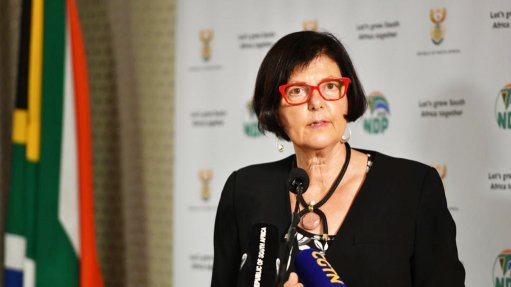
Forestry, Fisheries and the Environment Minister Barbara Creecy
The United Nations Convention on Biological Diversity’s (CBD’s) fifteenth Conference of the Parties (COP15) comes at an opportune time when South Africa is finalising the adoption of the White Paper on Conservation and Sustainable Use of South Africa Biodiversity, Forestry, Fisheries and the Environment Minister Barbara Creecy said on November 29.
She was speaking at a national stakeholder consultation ahead of the upcoming international talks on biological diversity to be held in Montreal, Canada, from December 7 to 19. This year’s meetings are being held under the theme “Ecological Civilization-Building a Shared Future for All Life on Earth”.
The aim of the stakeholder consultation was to consolidate South Africa’s position for the negotiations at CBD and raise awareness around biodiversity and related response efforts.
Creecy said the White Paper envisages a country where people and nature thrive and that it unpacked four broad goals – conservation, sustainable use, access and benefit sharing and transformative change.
She noted that these goals are supported by enablers for mainstreaming of biodiversity and ensuring that there are means for implementation such as finance and capacity building.
Creecy added that the White Paper envisages an inclusive, transformed society living in harmony with nature, where biodiversity conservation and sustainable use ensure healthy ecosystems, with improved benefits that are fairly and equitably shared for present and future generations.
“Conservation and sustainable use of biodiversity can contribute to addressing South Africa’s triple challenge of poverty eradication, inequality and job creation,” she said.
In terms of the country’s role in the CBD, Creecy said South African was one of 17 mega-biodiverse countries in the world, with large areas already designated for conservation.
Moreover, the country has high levels of endemism and species diversity; therefore, it has a special role to play in the negotiations as one of the global leaders with entrenched nature conservation and sustainable use and access and benefit sharing supporting by leading scientific expertise, she pointed out.
However, she noted that, despite these accolades, the sector remains largely untransformed and more work needs to be undertaken to ensure equitable beneficiation from the country’s biodiversity estate.
South Africa negotiates as part of the African Group of Negotiators and will lead several thematic area on this behalf with Secretariat and technical support.
Key issues of strategic importance to South Africa and Africa include adoption of the Post-2020 Global Biodiversity Framework; adoption of a specific post-2020 implementation plan for the Cartagena Protocol on Biosafety; a solution for sharing the benefits arising from the use of digital sequence information on genetic resources; protected areas and other effective area-based conservation measures; resource mobilisation and financial mechanisms; biodiversity and climate change; mainstreaming of biodiversity within and across sectors; and synthetic biology, Creecy outlined.
She elaborated on each on these areas with regard to the country’s position for COP15.
For example, in terms of resources mobilisation, negotiations will emphasise the need for closing the financial gap of up to $700-billion a year by 2030; support the adoption of a new deal for nature which demonstrates adequate resources which are commensurate with the ambition of Global Diversity Framework; and support the establishment of a dedicated global biodiversity fund, as well as a global strategy for resource mobilisation.
While stakeholders largely agreed with the positions outlined by Creecy, and indicated that they had been engaged in consultations which were inclusive, there were areas of enhancement that the negotiate team may need to consider.
For example, there were calls for increasing the pace and scale for protection of both marine and terrestrial ecosystems; increasing the scale of biodiversity stewardship; and developing and implementation and for the urgent expansion of biodiversity stewardship in landscapes home to vulnerable people.
The team will be engaging with local stakeholders on the ground on an ongoing basis to provide updates.
Creecy said that while the team aims to present a balanced, coherent stance at COP15, it is cognisant that not all of its goals will be realised.
South Africa will also be participating in side evets during COP15, and will also host one side event, and co-host 11 other events.
In the session it will it host, the country will showcase its finance initiative, policy reform mechanism and parentships to contribute to addressing the biodiversity funding gap.